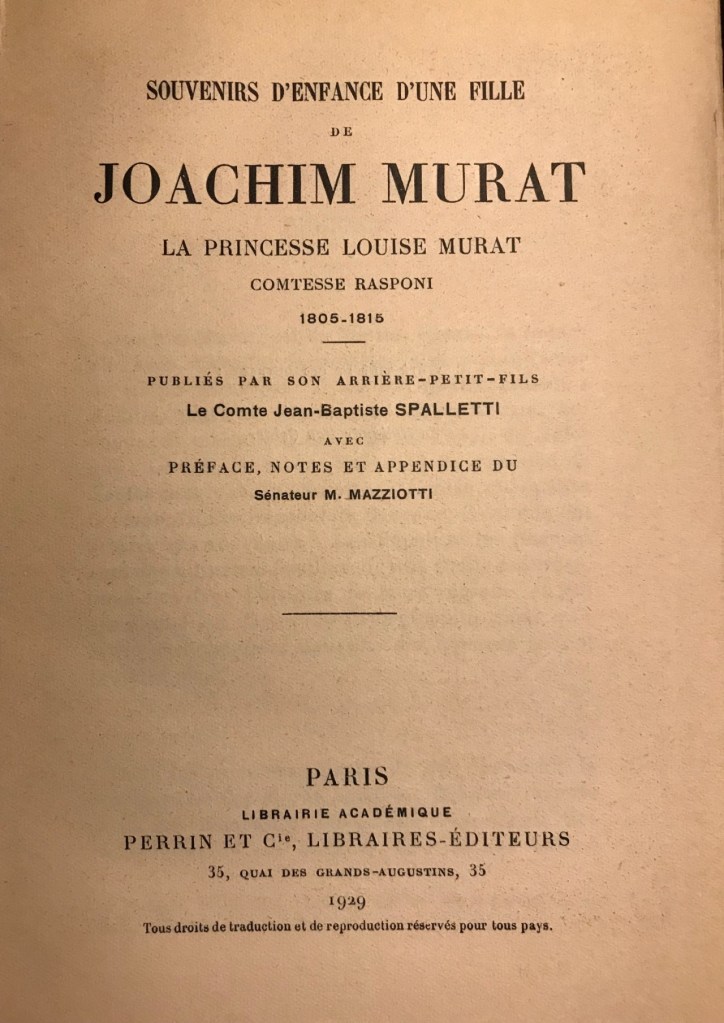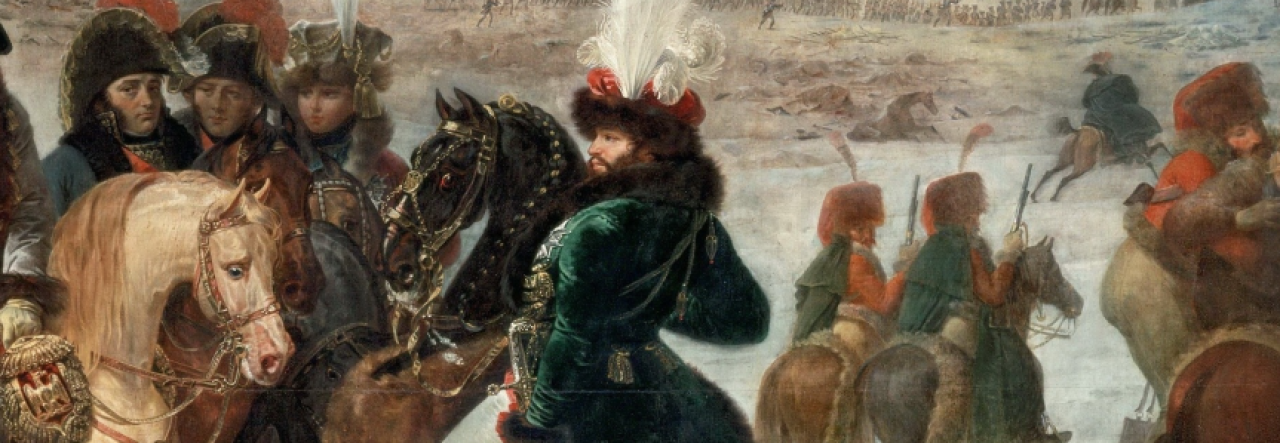
Continuing on with Louise Murat’s memoirs, we reach what not only Louise herself, but most historians likewise regard as the pivotal moment in the Murat/Napoleon relationship: the unhappy conclusion of the 1812 campaign. Louise points out that prior to this, the two men had always managed to overcome their previous differences upon being reunited again for one occasion or another; but this time, something changes permanently between them. Napoleon, whose anger has been mounting towards his errant brother-in-law for years now, responds to Murat’s premature departure of the army with a venom far out of proportion to Murat’s actions; Murat, already filled with resentment after years of humiliations at the hands of the Emperor, reaches his breaking point when Napoleon decides to inflict one more public blow to his reputation. Shortly after this episode, Murat will take the first steps towards his eventual defection, beginning his negotiations with the Austrians, in hopes of finally ruling Naples as a fully independent monarch.
Source: Souvenirs d’enfance d’une fille de Joachim Murat, by Louise Murat, pages 126-129.
***
But we leave these considerations and return to my Father and to the parties which agitated around him, augmenting by their pretensions the difficulties which arose each day between the two governments; but if the governments were not always of the best understanding, it was not the same for the two sovereigns. Each time that they saw each other again after some time of absence, each time at the head of the cavalry, my Father executed some of those prowesses which recalled those of the ancient knights, all their grudges were forgotten, and intimacy was established between them anew and unabated.
This intimacy, however, and this good understanding, suffered a strong alteration at the end of the Russian campaign. At this time, the Emperor, leaving for Paris, had left to the King the command of the French army, which is to say of the few men, glorious and mutilated debris, to which was still given that name… but my Father soon transmitted it himself to Prince Eugène and left without having preemptively asked the Emperor’s authorization. This hasty departure exasperated the Emperor with him to such an extent that all the services of my Father were forgotten in an instant, even his heroic valor during this ill-fated war, he let himself be transported by his resentment even to wanting, in an order of the day now famous[1], to belittle him and to wither him in the eyes of the army and, it can be said, of all Europe.
If the Emperor had given himself time to calm down, he would not have acted thus, because my Father had good reasons to justify his conduct.
Some very alarming letters that he received from Naples made him ardently desire to return there, but it wouldn’t have been enough to determine it if his health, terribly tested by the fatigues of this disastrous campaign, had not rendered a total repose indispensable to him. I do not believe, however, that these two reasons, though so strong in themselves, would have been enough to decide his departure, if he hadn’t carried with him the profound conviction that he could only influence in an adverse fashion the fate of the troops who were under his orders.[2] In effect, in what way could he be useful to this handful of braves condemned with him to a forced inaction until the arrival of reinforcements which, after a long space of time, might, from Paris, come to join him? Absolutely none. Generals and marshals abounded in this army, and still, by the way, their insubordination and their ill will were not the least of my Father’s embarrassments. He therefore left the troops entrusted to him surrounded by experienced leaders, and, tranquil about their fate, he turned over his command to the adopted son of the Emperor and moved towards his States.
The majority of historians have strongly blamed my Father in this circumstance, and perhaps, in effect, he had been wrong. He had hastened his departure too much, for which he should have waited for the Emperor’s authorization… I do not deny it; but while admitting it all, it is impossible for me to find in this fault the gravity that was given to it. What more would the Emperor have done if, by his departure, the King had risked compromising the army that had been entrusted to him? … If my Father had committed an error, had not the Emperor, on his part, by his precipitation and his rigor in condemning him, sinned by ingratitude towards him? Could he not have used more indulgence towards a friend, an old companion in arms, a brother?
My Father deeply resented the public insult made to his honor, and the particular letters that he and the Queen received from the Emperor on this occasion[3] only poisoned this wound already so cruel.
***
[1] In the 27 January 1813 edition of the Moniteur, Napoleon declared that “Because of ill health, the king of Naples has given up command of the army, which he has placed in the hands of the Viceroy. The latter is more accustomed to the administration of important affairs; he has the Emperor’s confidence.”
[2] Murat never responded well to crises. Berthier recognized how ill-suited the King of Naples was for command of the crumbing French army in Russia almost immediately, writing in a ciphered letter to Napoleon on 15 December 1812 that “The King of Naples is the first of men for executing the orders given by a Commander-in-Chief on the battlefield. The King of Naples is in every way the most incapable of acting as Commander-in-Chief himself. He should be replaced at once.”
[3] Napoleon wrote to Murat on 26 January 1813: “I don’t want to talk to you of the displeasure I feel at your course of conduct since my departure from the army, for that is the result of your weakness of character. However, I have thought it right to give my opinion of it frankly to your wife, the Queen of Naples. You are a good soldier on the field of battle, but elsewhere you have neither energy nor character. I presume you are not one of those who think the lion is dead. If you count on this you make a mistake. Since my departure from Wilna you have done me all the harm you could. The title of king has turned your head. If you want to keep that title you must conduct yourself differently from what you have so far done. The opportunity for reinstating yourself in my good opinion will not be long before it presents itself.” His letter to Caroline, dated two days earlier, stated that “Your husband, the King of Naples, deserted the army on the 16th. He is a brave man on the battlefield, but he is weaker than a woman or a monk when he is not in sight of the enemy. He has no moral courage. I leave it to you to express to him all the displeasure I have felt at his conduct in this matter.” Between the statement in the Moniteur recorded above, and these two letters, Murat, according to biographer Hubert Cole, “closed his door on the French ambassador. He considered calling the Estates and having them proclaim him king of the Two Sicilies so that he could reign without benefit of Napoleon or France. Caroline dissuaded him, with great difficulty.” (Cole, The Betrayers, 192)

Napoleon fled Russia so he had no standing to say anything
LikeLike
Yes, and he used he excuse that the political situation in France required his immediate presence—really just a pretext for him not wanting to be present as the Grande Armée continued its disintegration.
Murat’s excuse (concern over politics in Naples) was basically the same. And I think he both realized his unsuitability for the task he’d been left with, and likewise didn’t want to be left holding the bag during this catastrophe. I find it hard to blame him too much here. A part of me thinks Napoleon wanted to use him as a scapegoat for the army’s collapse during the retreat and that’s why Napoleon was so PO’ed when Murat bolted prematurely. He’d asked Napoleon for permission to go back to Naples and, strangely, even though Napoleon acknowledged Murat’s unsuitability when Berthier recommended he be replaced, Napoleon didn’t grant him permission to go.
LikeLike
Pingback: "I owe it to myself not to deviate" – Project Murat